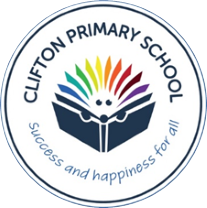Our ‘Clifton’ Curriculum
Our Curriculum
Our curriculum is designed to meet our school vision of ensuring all children flourish and become confident, successful, well balanced and self-motivated individuals. This design ensures the full breadth of early years and national curriculum is covered so children have a broad and balanced education as they move from Nursery to Year 6.
To achieve this, the following key aims drive the development of our work;
- Excellence – we aim for a curriculum underpinned by excellence. We have high expectations and aspirations for all of our children and, in doing so, we expect the highest quality curriculum design, teaching and learning for our children. These expectations are delivered and reinforced daily through adult modelling, peer learning and celebrating successes. Our aim is for children to strive for excellence in all that they do and have access to the very best education, resources and experiences.
- Knowledge & Skills – we aim for children’s acquisition of knowledge and vocabulary to be developed rigorously over time, in order for children to retain and use this. The knowledge and vocabulary children ‘own’ has a significant impact on their future life-chances. The knowledge focuses on the things children need to know in the subject we are learning about and that needed to flourish throughout education and life
- Worldliness – Due to our context, understanding the wider world and how they can contribute to it is is a key aim of our curriculum. Learning is given context so our children are able to understand the area in which they live and have the confidence to understand and explore the wider world.
To create our curriculum, school leaders evaluated published schemes of work to ensure they would enable us to meet our curriculum aims and school vision. The following aspects were key to the review in that they;
- had clear sequencing of knowledge, skills and vocabulary
- could be adapted to meet the needs of mixed age classes
- reduced pressure on staff workload
Where possible, the individual subjects are linked together in an umbrella theme to allow children to make links between subjects.
Our curriculum is designed and monitored by our subject teams with teachers working collaboratively on subjects due to the size of our team. We also work closely across our three schools (Clifton, Milburn, Beaconside) as well as within our local cluster on curriculum and subject leader development.
Teaching our curriculum
Our children are taught predominantly in mixed age classes with the curriculum adapted through a carefully planned cycle to ensure the buildup of knowledge and skills over time. In some subjects, children are taught in year groups or smaller groups linked to their knowledge and understanding of that area or where adapting to mixed age classes was more challenging.
The use of teachers and teaching assistants is carefully planned to make the best use of time and resources and ensure all children access our curriculum offer. This includes pre-teaching, post-teaching and tutoring to maintain rates of progress and address learning for children falling or at risk of falling behind.
Educational visits and experiences are planned throughout the curriculum to give children first hand experiences of key aspects of learning and make use of the rich local resources available to support learning.
Understanding how well our children are doing
Across all subject areas we;
- Firstly, aim to ensure quality and consistent delivery of the curriculum so all children can access the learning we set out through curriculum mapping
- Assess at the point of learning by teachers and teaching assistants checking and giving feedback to children as well as assessing their written work.
In English and Mathematics, as well as the assessment above, detailed assessments are carried out to ensure no child falls behind as these areas underpin children’s abilities to access all areas of the curriculum, but are also an outcome of a broad and rich curriculum.
- Reading – In Reception to Year 2 we use regular Read Write Inc assessments to monitor children’s progress in phonics and reading. From Year 2 onwards accelerated reader quizzes are used regularly to ensure children are reading suitable books and that reading progress is being monitored
- Phonics – six weekly assessments are used to inform teaching and identify groupings for children as well as identify early any children that require additional tutoring.
- Writing – all children are assessed regularly in line with National Curriculum standards for their year groups, this then informs teaching and learning
- Mathematics – start and end of unit assessments to identify the knowledge that children have retained
- NFER assessments start in the Summer term of year 1 and continue through school so we can check the overall progress and attainment of children against age related expectations and identify children at risk of falling behind.
Across subject areas other than English and Mathematics, as well as the assessment above, we use cumulative quizzes to check the knowledge children have retained from a unit of learning. This helps us to ensure children are learning effectively and developing the knowledge they need for the next unit of work, year or phase of education.
Our whole school curriculum makes links from the Early Years through to Year 6.
Please click on the image below for an overview of our Early Years curriculum for Nursery and Reception:
